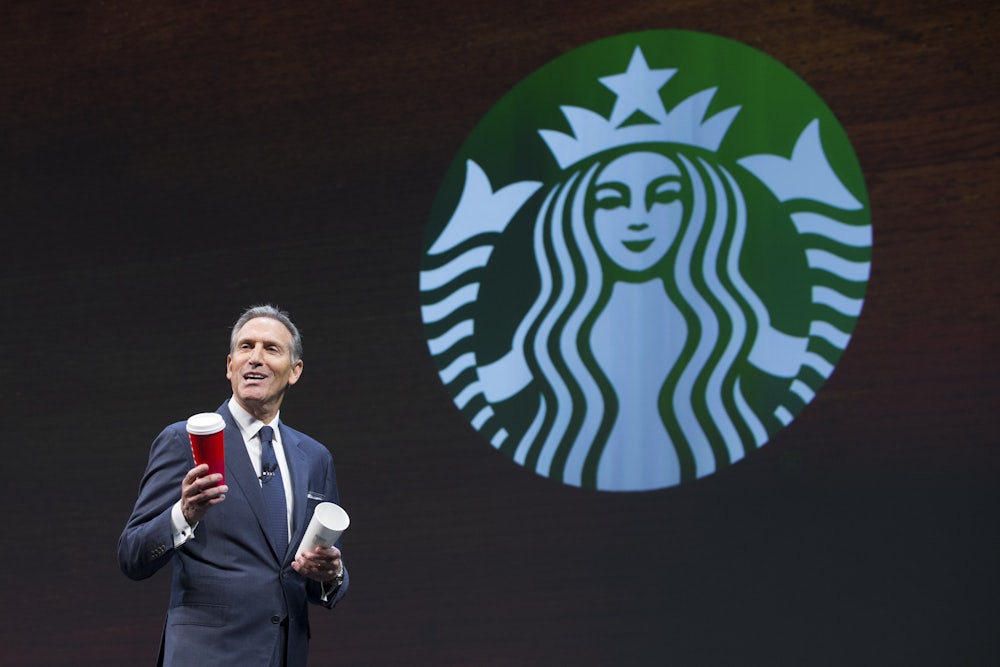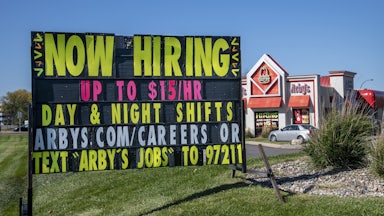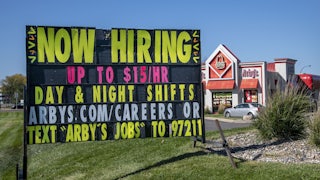In recent months, the burgeoning unionization drives at companies such as Amazon and Starbucks have provided some of the only encouraging political news in this dreary, fussy year in American life. Still, while workers’ rights at these companies may be on the upswing, it remains pretty clear that gliding through life in the e-suites is a better deal than manning the frappuccino blenders. Case in point: Outgoing Starbucks CEO Kevin Johnson is swanning out the door with a bonus totaling at least $60 million. If you’re keeping score, a person earning the median annual wage in America would have to work just shy of 1,752 years to accrue such a sum.
Johnson’s parting gift, which Marketwatch’s Brett Arends refers to as a “golden goodbye,” is his reward for a five-year tenure in which Starbucks’s stock underperformed the S&P 500, and it follows a 2019 retention bonus of around $25 million. As Arends notes, Starbucks’s stock “rallied $4 on the news” of his departure, which seems like a savage burn until you realize that the value of Johnson’s shares in the company surged as well, netting him something on the order of $12 million extra. “You don’t have to be Leon Trotsky to think this is messed up,” writes Arends.
It’s been a long while since I walked into a Starbucks and felt the inspiring force of some bold executive’s $60 million idea. But Howard Schultz, the former Starbucks CEO who is returning to that position after a few years spent tragicomically attempting to switch lanes, seems bent on making such a move right away. As Vice’s Edward Ongweso Jr. reported, during an April 4 “town hall” meeting, Schultz “awkwardly asked multiple times if anyone in the audience was a ‘digital native,’” or had been following “what has been happening with [non-fungible tokens].”
This was apparently the build-up to Schultz’s big—but rather poorly timed—reveal that “sometime before the end of this calendar year, we are going to be in the NFT business.” In a statement that sounded more like a coded message that Schultz had lost a bet with the devil than a sane business innovation, he said, “If you look at the companies, the brands, the celebrities, the influencers, that are trying to create a digital NFT platform and business, I can’t find one of them that has the treasure trove of assets that Starbucks has, from collectibles to the entire heritage of the company.” (Not all of the company’s assets have been deemed valuable by Schultz: During his first week, the company fired four pro-union employees in what looks to be an accelerated campaign to quash the unionization effort.)
As you ponder the future of Starbucks becoming an “NFT business,” it’s not hard to imagine that someday, Schultz’s story might form the basis of one more product sluicing through the scam-to-streaming-docuseries pipeline, where he might ultimately join other legendary disasters of corporate governance like Adam Neumann’s WeWork or Elizabeth Holmes’s Theranos. But it turns out that these famous failures are mere pikers; their scams bush-league compared to corporate America’s slow-moving rug-pull. As Rick Wartzman recently reported for Capital and Main, over the past 60 years corporations have funneled an increasingly high proportion of revenues to CEOs and shareholders, mostly at the expense of workers.
As Wartzman notes, this is not an easy phenomenon to track, because corporations take pains to hide information about where their revenue goes. He was able to dredge up necessary data for six firms, all of which showed the same trend: Between 1960 and 2019, the portion of revenue flowing to shareholders expanded dramatically, and the share flowing to workers almost always shrank (only Wells Fargo currently pays a higher proportion now than it did then). Furthermore, “at five of the six, less is going to taxes, a reflection of a markedly lower U.S. corporate tax rate—21 percent vs. 52 percent in 1960—and, very likely, more tax avoidance by corporations.” This all occurred during a period in which some of these firm’s revenues expanded tenfold—in some instances, several hundredfold.
As shareholders and executives make off with a larger slice of the revenue pie, it’s worth asking: Has our CEO-ing gotten better lately? Is corporate governance improving? I’m not averse to the argument that running a firm has grown substantially more complex in the past 60 years, placing larger demands on corporate leaders and potentially entitling them to more helpings from the trough. But it’s worth wondering if the people who’ve created all of this complexity aren’t the same ones benefiting from it.
And recent history instructs us to be wary of such claims. After all, in the aftermath of the 2008 financial crisis, the public was told over and over again that the people who caused the crash were the only ones who truly understood all of Wall Street’s complications and thus had to be retained to fix the mess they made. And these same folks fought hard to retain their big bonuses, on the grounds that such payouts were necessary to attract top talent. As workers experience diminishing returns for their labor—and increasing hostility toward their battle for their own workplace rights—I find myself still wondering when that talent is finally going to emerge. I don’t think Howard Schultz stumbling ass-first into the NFT market is the visionary idea I’ve been waiting for.
This article first appeared in Power Mad, a weekly TNR newsletter authored by deputy editor Jason Linkins. Sign up here.










